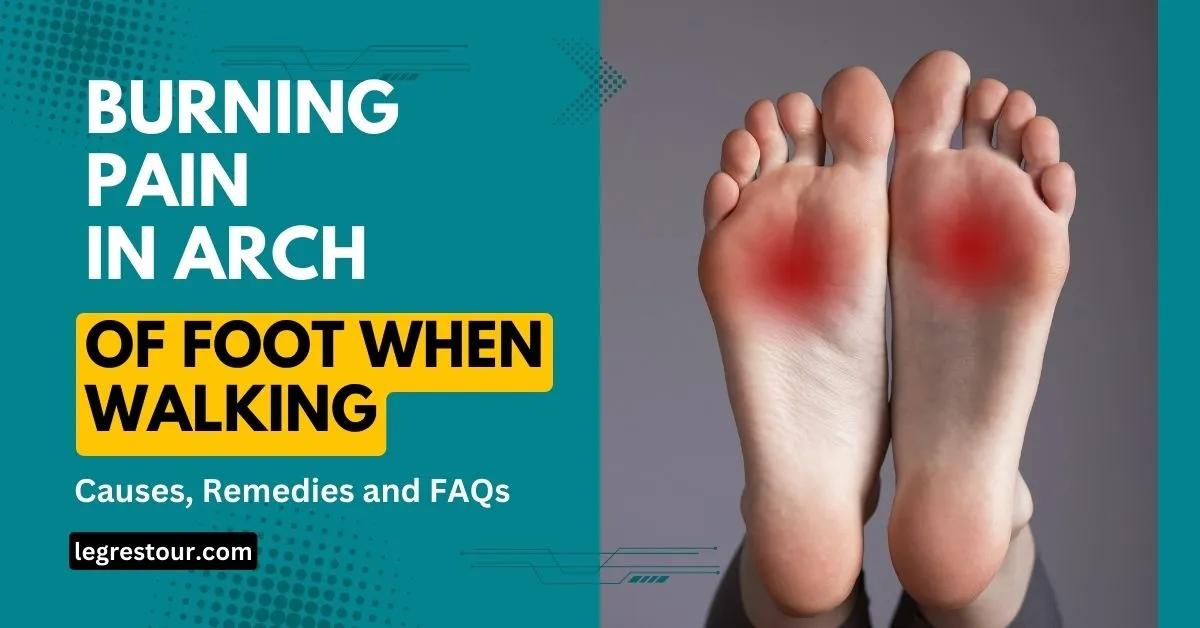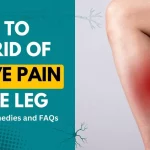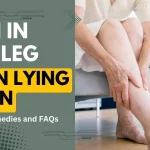Feeling a burning pain in arch of foot when walking can be very uncomfortable and concerning. This type of foot pain, medically known as plantar fasciitis, affects millions of people. While the exact cause is often unclear, there are several effective remedies you can try to find relief. This article will cover the potential causes of burning arch pain when walking, home treatments and medical options to consider, as well as answers to frequently asked questions.
What Causes Burning Pain in Arch of Foot When Walking?
There are several possible causes for feeling a burning pain in the arch of your foot when walking:
Plantar Fasciitis
The most common cause of burning pain in the foot arch is plantar fasciitis. This condition involves inflammation of the plantar fascia, a thick band of connective tissue that runs across the bottom of your foot. When the plantar fascia becomes irritated and inflamed, it can feel like a stabbing or burning pain in the arch area. Factors that contribute to plantar fasciitis include:
- Tight calf muscles or hamstrings placing excess strain on the plantar fascia
- High arches or flat feet disrupting proper foot mechanics
- Obesity putting increased pressure on the feet
- Standing or walking for long periods on hard surfaces
- Sudden increases in activity level like new runners
- Worn out or improper shoes that don’t provide enough support
Nerve Damage
Damage or irritation to the nerves in your feet can also cause a burning sensation when walking. Contributing factors include diabetes, vitamin deficiencies, and inflammatory disorders. Compression or entrapment of nerves in the ankle or foot areas can also lead to burning arch pain.
Arthritis
Osteoarthritis, rheumatoid arthritis, and other forms of arthritis that affect the foot bones, joints, or arch tissues can result in inflammation and burning pain when walking. Arthritis leads to damage of the protective cartilage in joints.
Bone Spurs
Extra bone growths called bone spurs can develop on the heel bone or other foot bones. Bone spurs in the arch or heel areas can press against soft tissues like nerves or the plantar fascia, causing a burning feeling with each step.
Stress Fractures
Stress fractures are tiny cracks or fissures in the foot bones caused by repetitive overuse. Stress fractures often occur in the arch area and are common in athletes. The fracture sites become inflamed, leading to a burning sensation when walking or running.
Morton’s Neuroma
This condition involves irritated or thickened nerve tissue between the toes which can feel like burning arch pain when walking. It occurs most often between the third and fourth toes. Contributing factors include high impact exercise, tight shoes, and foot deformities.
Metatarsalgia
General pain and inflammation in the ball of the foot is called metatarsalgia. It can make the arch area feel like it’s burning due to shared nerve connections. Contributing factors include arthritis, calluses, and high impact activities.
Effective Home Treatments for Burning Arch Pain
If you experience burning arch pain when walking, there are several home care treatments you can try for relief:
Rest
Take a break from any high impact activities that aggravate your foot pain until it starts feeling better. Avoid standing or walking for prolonged periods. Elevate your feet to reduce inflammation.
Ice
Apply ice packs or frozen gel packs to the painful arch area for 10-15 minutes several times per day to reduce inflammation. Always wrap the ice in a thin towel to protect your skin.
Heat
Alternate using heat with ice treatments. Apply a warm compress or soak your foot in warm epsom salt water to increase circulation and loosen tight muscles.
Massage
Gently massaging and stretching your foot arch can help relieve symptoms. Use your thumbs or a tennis ball to massage the plantar fascia in the arch. Stretch your calf muscles and Achilles tendon which attach to the heel.
NSAIDs
Non-steroidal anti-inflammatory medications like ibuprofen, naproxen, or aspirin can temporarily alleviate arch pain and reduce inflammation. Always take as directed.
Orthotics
Custom shoe inserts prescribed by a podiatrist provide arch support and improve foot alignment to take pressure off the plantar fascia. They help alleviate arch pain with walking.
Night Splint
Wearing a foot brace or night splint while sleeping can gently stretch your plantar fascia and Achilles tendon to gradually reduce morning arch pain.
Shoe Modifications
Wear comfortable athletic shoes with proper arch support and cushioning. Limit wearing flat shoes which don’t support the arch. Temporarily insert cushioned arch pads in your shoes.
Weight Loss
If excess weight is contributing to your arch pain, work on gradually losing pounds to reduce mechanical pressure on your feet.
When to See a Doctor
Make an appointment with your doctor if home care strategies don’t substantially decrease your arch pain after several weeks. Seek prompt medical treatment for any of the following:
- Constant or worsening burning pain not relieved by rest
- Pain combined with swelling in the foot
- Numbness, tingling, or weakness in the foot
- Significant impairment in walking or performing daily activities
- Arch pain not improving after 6 months of home treatment
Your doctor can properly evaluate your symptoms, order diagnostic imaging if needed, and prescribe additional therapies. Custom orthotics, physical therapy, medications, injections, or surgery may be considered for stubborn cases of plantar fasciitis. Early treatment leads to the best outlook.
Medical Treatment Options for Burning Arch Pain
If your foot arch pain persists despite conservative home treatments, talk to your doctor. They may recommend trying the following medical therapies:
Prescription Medications
Non-steroidal anti-inflammatory drugs (NSAIDs) or low dose corticosteroid medications can be prescribed to more powerfully reduce inflammation. Your doctor may also prescribe specific nerve pain medications.
Physical Therapy
Working with a physical therapist can provide gentle stretching, massage, ultrasound treatments, and exercises to strengthen your feet, ankles, and leg muscles. This improves stability, flexibly, and function.
Orthotic Devices
Custom-made arch supports or orthotic shoe inserts help take pressure off the plantar fascia and improve foot mechanics. Night splints also assist with gentle arch stretching.
Extracorporeal Shockwave Therapy
This uses pulsed sound waves directed at the heel and arch areas to stimulate healing of the plantar fascia. Several sessions are usually needed.
Surgery
If more conservative treatments fail, surgery may be warranted to release or detach a portion of the plantar fascia from the heel bone. This reduces tension and inflammation. Recovery takes several weeks.
Alternative Therapies
Options like acupuncture, massage, or rolfing may provide adjunctive relief for chronic arch pain. Talk to your healthcare provider.
Best Foot Massager for Wide Feet
Frequently Asked Questions (FAQs)
1. Is the burning pain in my arch anything serious?
In most cases, burning arch pain is caused by plantar fasciitis which is not serious or life threatening. However, it’s a good idea to see your doctor for a full evaluation, especially if pain persists. Rarely, it can signal an underlying health condition requiring specific treatment.
2. What exercises help relieve burning arch pain?
Calf stretches, using a resistance band around the foot to strengthen the plantar fascia, towel scrunches with the toes, and foot intrinsic exercises can all help reduce arch pain. Avoid high impact activities until pain improves.
3. How long does plantar fasciitis last?
The typical duration of a bout of plantar fasciitis is 6-18 months. With conservative home care, the pain usually gradually improves over this timeframe for most people. Seeking medical treatment can help speed recovery.
4. Should I take anti-inflammatory medication for foot arch pain?
Over-the-counter NSAID medication for a short period can be helpful in decreasing inflammation that contributes to arch pain. Use the lowest effective dose. If OTC options aren’t providing enough relief, prescription anti-inflammatory drugs may be warranted.
5. Do I need surgery for my burning arch pain?
Surgery like a plantar fascia release is typically only recommended if arch pain is severe and remains poorly responsive to at least 6-12 months of more conservative treatments like orthotics, physical therapy, and injections. Always exhaust other options first.
6. Will custom orthotics cure my painful arch?
Prescription orthotics are very helpful for most people with plantar fasciitis, especially when used along with other treatments. They provide arch support, reduce strain on the plantar fascia, and can make walking comfortable again. But orthotics alone may not completely resolve the problem.
7. Can losing weight help alleviate arch pain?
Yes, if excess weight is contributing to arch pain, losing some pounds can significantly relieve pressure on your feet. Even a modest 5-10% reduction in



